Abstract
Transforming growth factor alpha (TGF alpha) and Transforming growth factor beta-1 (TGF-beta 1) are growth regulatory for breast cancer cell lines in vitro and several studies have suggested that levels of the receptor for TGF alpha, the epidermal growth factor (EGFR) in tumour biopsies predict relapse and survival. We have examined the prognostic significance of TGF alpha, TGF-beta 1 and EGFR mRNA expression in a series of patients with primary breast cancer with a median follow up period of 60 months. In 167 patients the expression of TGF-beta 1 was inversely correlated with node status (P = 0.065) but not ER status, tumour size or menopausal status. Patients with high levels of TGF-beta 1 had a longer disease free interval with a significantly longer probability of survival at 80 months although the overall relapse free survival was not increased. EGFR mRNA expression was measured in 106 patients and was inversely correlated with ER status (P = 0.018). EGFR levels did not predict for early relapse or survival. TGF alpha mRNA levels were measured in 104 patients, no correlation was seen tumour size, node status, Er status, or clinical outcome.
Full text
PDF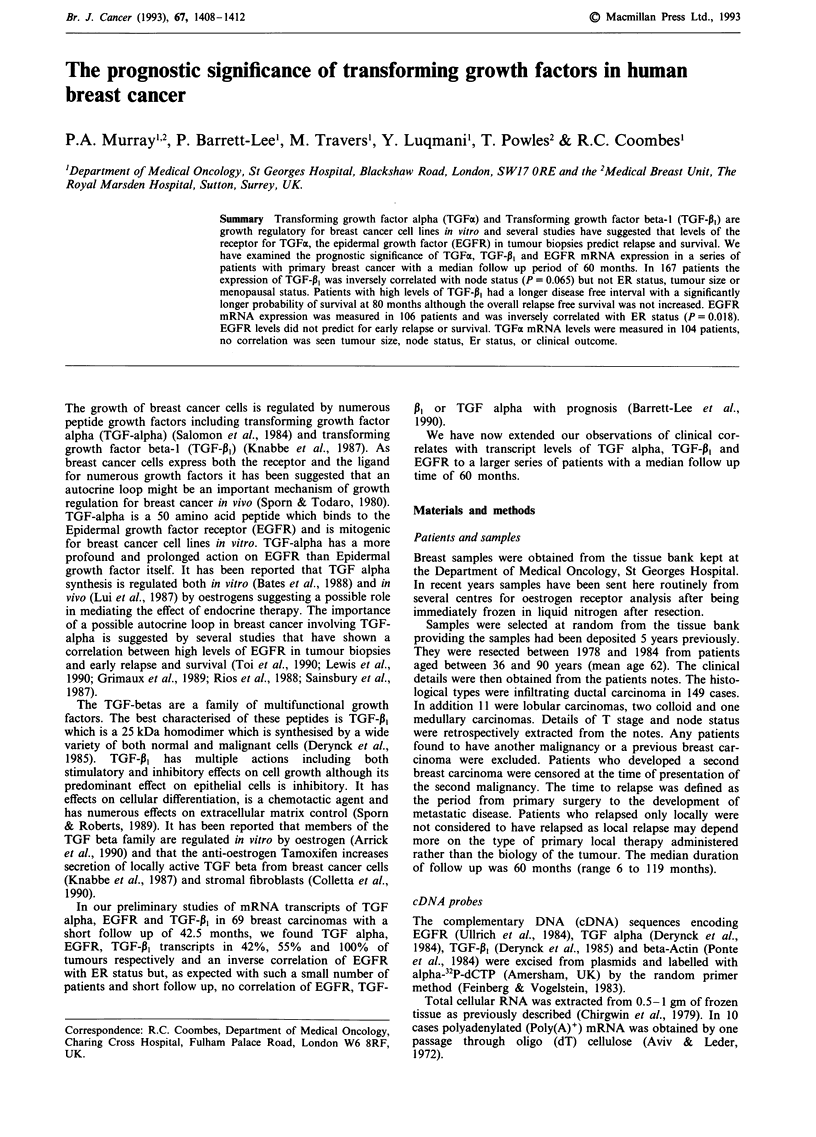
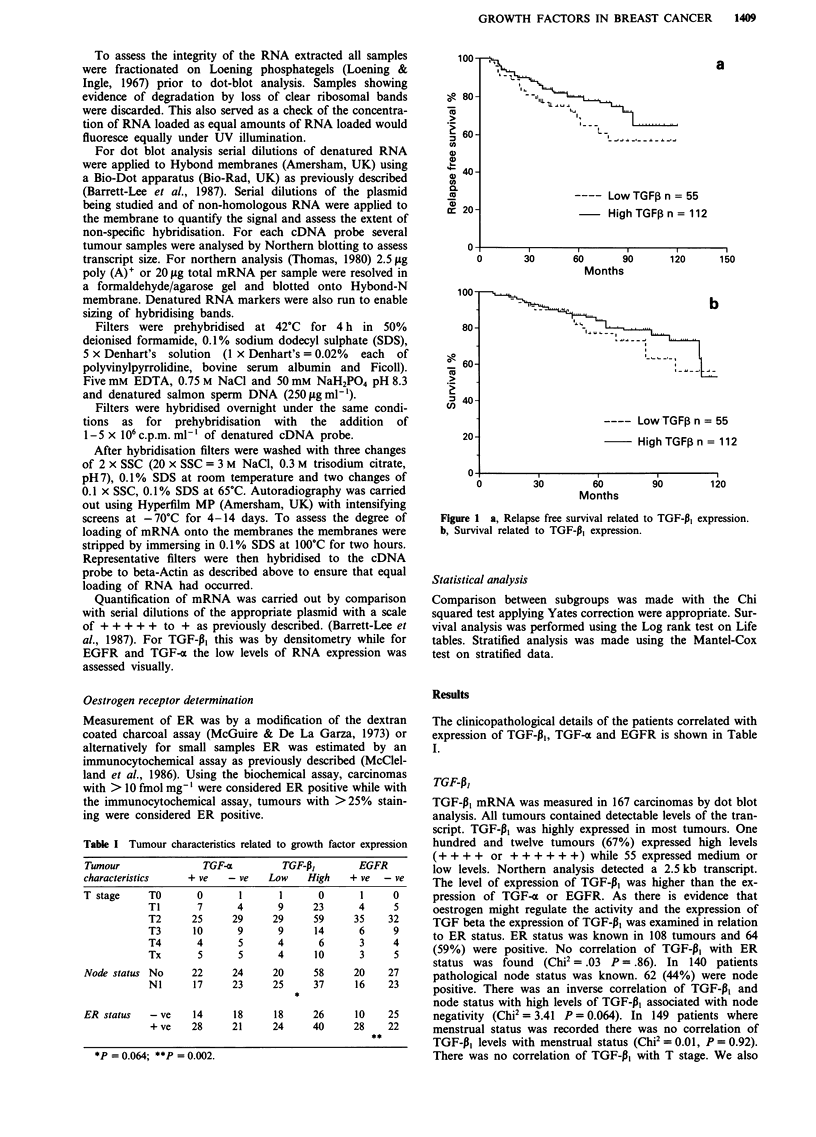
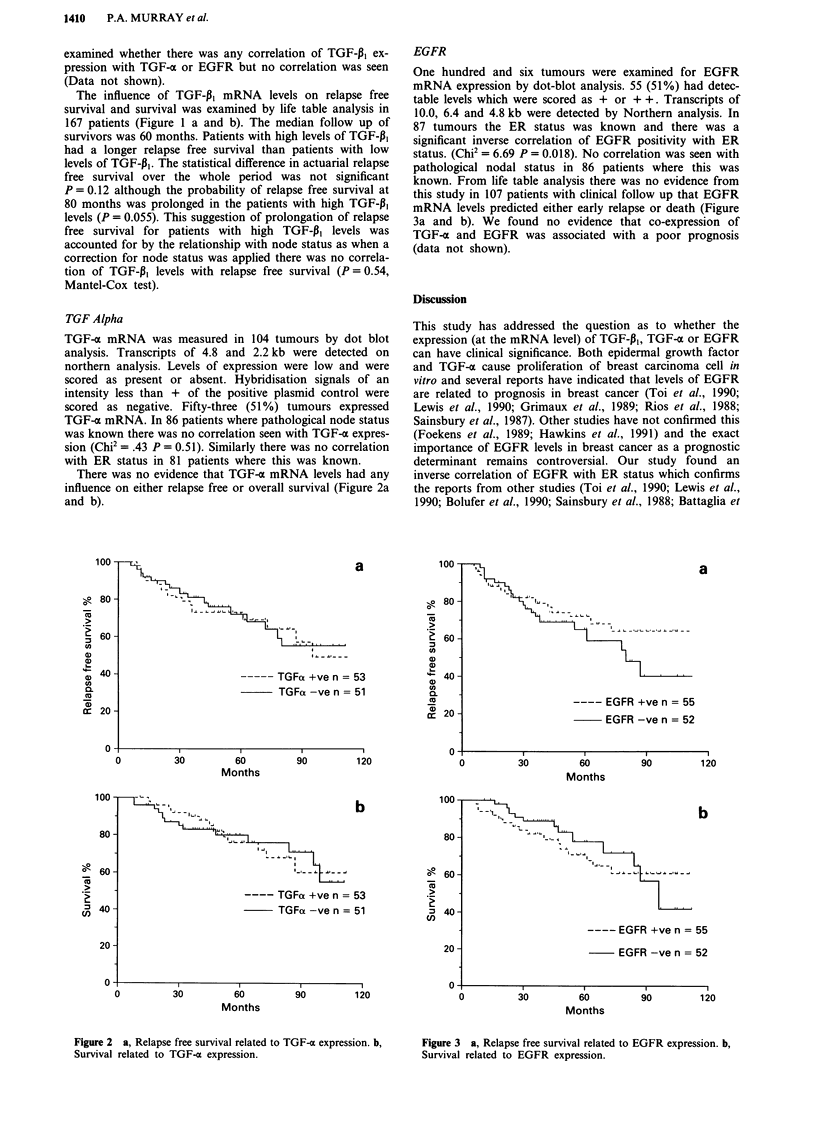
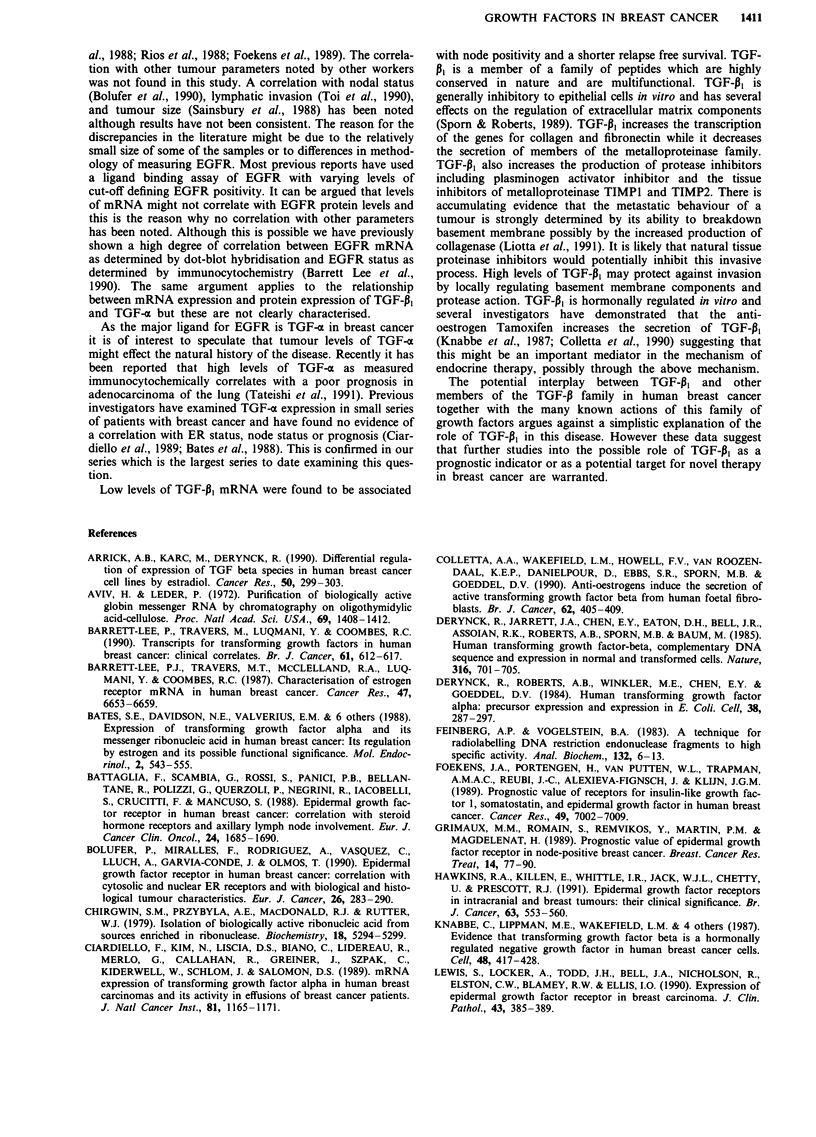
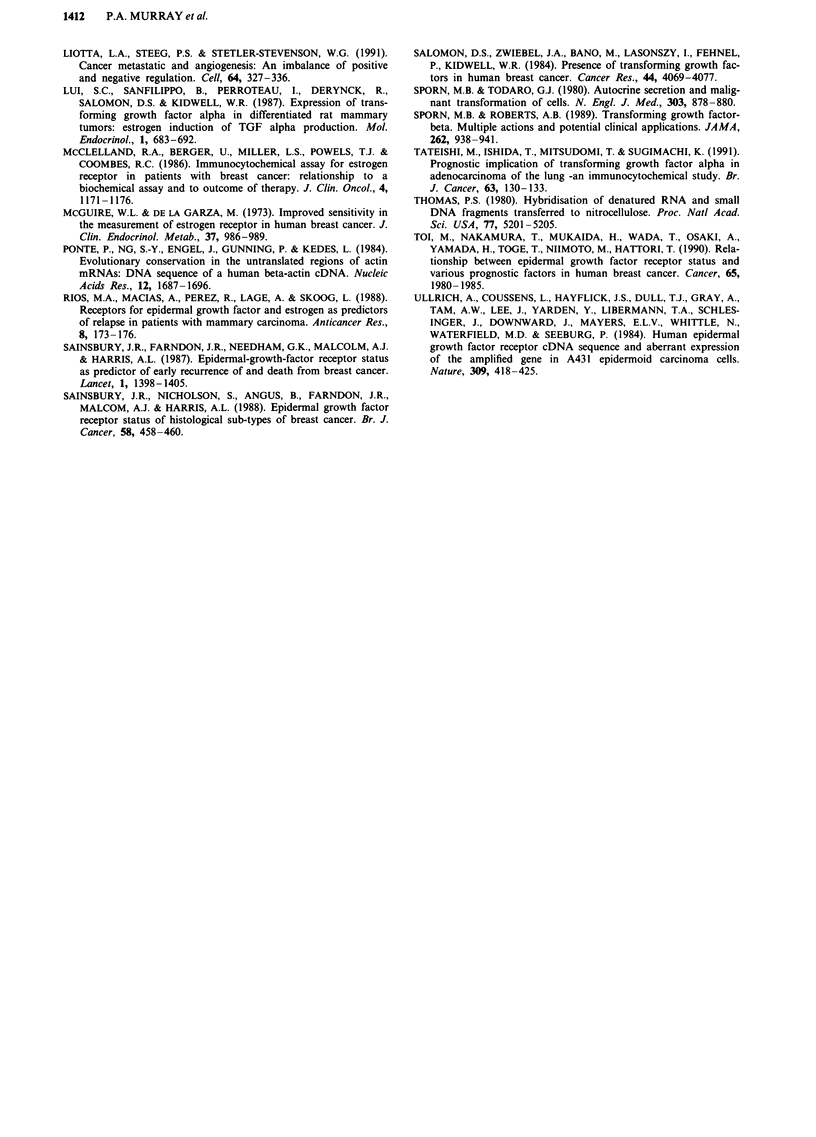
Selected References
These references are in PubMed. This may not be the complete list of references from this article.
- Arrick B. A., Korc M., Derynck R. Differential regulation of expression of three transforming growth factor beta species in human breast cancer cell lines by estradiol. Cancer Res. 1990 Jan 15;50(2):299–303. [PubMed] [Google Scholar]
- Aviv H., Leder P. Purification of biologically active globin messenger RNA by chromatography on oligothymidylic acid-cellulose. Proc Natl Acad Sci U S A. 1972 Jun;69(6):1408–1412. doi: 10.1073/pnas.69.6.1408. [DOI] [PMC free article] [PubMed] [Google Scholar]
- Barrett-Lee P. J., Travers M. T., McClelland R. A., Luqmani Y., Coombes R. C. Characterization of estrogen receptor messenger RNA in human breast cancer. Cancer Res. 1987 Dec 15;47(24 Pt 1):6653–6659. [PubMed] [Google Scholar]
- Barrett-Lee P., Travers M., Luqmani Y., Coombes R. C. Transcripts for transforming growth factors in human breast cancer: clinical correlates. Br J Cancer. 1990 Apr;61(4):612–617. doi: 10.1038/bjc.1990.136. [DOI] [PMC free article] [PubMed] [Google Scholar]
- Bates S. E., Davidson N. E., Valverius E. M., Freter C. E., Dickson R. B., Tam J. P., Kudlow J. E., Lippman M. E., Salomon D. S. Expression of transforming growth factor alpha and its messenger ribonucleic acid in human breast cancer: its regulation by estrogen and its possible functional significance. Mol Endocrinol. 1988 Jun;2(6):543–555. doi: 10.1210/mend-2-6-543. [DOI] [PubMed] [Google Scholar]
- Battaglia F., Scambia G., Rossi S., Panici P. B., Bellantone R., Polizzi G., Querzoli P., Negrini R., Iacobelli S., Crucitti F. Epidermal growth factor receptor in human breast cancer: correlation with steroid hormone receptors and axillary lymph node involvement. Eur J Cancer Clin Oncol. 1988 Nov;24(11):1685–1690. doi: 10.1016/0277-5379(88)90068-5. [DOI] [PubMed] [Google Scholar]
- Bolufer P., Miralles F., Rodriguez A., Vazquez C., Lluch A., Garcia-Conde J., Olmos T. Epidermal growth factor receptor in human breast cancer: correlation with cytosolic and nuclear ER receptors and with biological and histological tumor characteristics. Eur J Cancer. 1990 Mar;26(3):283–290. doi: 10.1016/0277-5379(90)90223-g. [DOI] [PubMed] [Google Scholar]
- Chirgwin J. M., Przybyla A. E., MacDonald R. J., Rutter W. J. Isolation of biologically active ribonucleic acid from sources enriched in ribonuclease. Biochemistry. 1979 Nov 27;18(24):5294–5299. doi: 10.1021/bi00591a005. [DOI] [PubMed] [Google Scholar]
- Ciardiello F., Kim N., Liscia D. S., Bianco C., Lidereau R., Merlo G., Callahan R., Greiner J., Szpak C., Kidwell W. mRNA expression of transforming growth factor alpha in human breast carcinomas and its activity in effusions of breast cancer patients. J Natl Cancer Inst. 1989 Aug 2;81(15):1165–1171. doi: 10.1093/jnci/81.15.1165. [DOI] [PubMed] [Google Scholar]
- Colletta A. A., Wakefield L. M., Howell F. V., van Roozendaal K. E., Danielpour D., Ebbs S. R., Sporn M. B., Baum M. Anti-oestrogens induce the secretion of active transforming growth factor beta from human fetal fibroblasts. Br J Cancer. 1990 Sep;62(3):405–409. doi: 10.1038/bjc.1990.307. [DOI] [PMC free article] [PubMed] [Google Scholar]
- Derynck R., Jarrett J. A., Chen E. Y., Eaton D. H., Bell J. R., Assoian R. K., Roberts A. B., Sporn M. B., Goeddel D. V. Human transforming growth factor-beta complementary DNA sequence and expression in normal and transformed cells. Nature. 1985 Aug 22;316(6030):701–705. doi: 10.1038/316701a0. [DOI] [PubMed] [Google Scholar]
- Derynck R., Roberts A. B., Winkler M. E., Chen E. Y., Goeddel D. V. Human transforming growth factor-alpha: precursor structure and expression in E. coli. Cell. 1984 Aug;38(1):287–297. doi: 10.1016/0092-8674(84)90550-6. [DOI] [PubMed] [Google Scholar]
- Feinberg A. P., Vogelstein B. A technique for radiolabeling DNA restriction endonuclease fragments to high specific activity. Anal Biochem. 1983 Jul 1;132(1):6–13. doi: 10.1016/0003-2697(83)90418-9. [DOI] [PubMed] [Google Scholar]
- Foekens J. A., Portengen H., van Putten W. L., Trapman A. M., Reubi J. C., Alexieva-Figusch J., Klijn J. G. Prognostic value of receptors for insulin-like growth factor 1, somatostatin, and epidermal growth factor in human breast cancer. Cancer Res. 1989 Dec 15;49(24 Pt 1):7002–7009. [PubMed] [Google Scholar]
- Grimaux M., Romain S., Remvikos Y., Martin P. M., Magdelénat H. Prognostic value of epidermal growth factor receptor in node-positive breast cancer. Breast Cancer Res Treat. 1989 Oct;14(1):77–90. doi: 10.1007/BF01805978. [DOI] [PubMed] [Google Scholar]
- Hawkins R. A., Killen E., Whittle I. R., Jack W. J., Chetty U., Prescott R. J. Epidermal growth factor receptors in intracranial and breast tumours: their clinical significance. Br J Cancer. 1991 Apr;63(4):553–560. doi: 10.1038/bjc.1991.130. [DOI] [PMC free article] [PubMed] [Google Scholar]
- Knabbe C., Lippman M. E., Wakefield L. M., Flanders K. C., Kasid A., Derynck R., Dickson R. B. Evidence that transforming growth factor-beta is a hormonally regulated negative growth factor in human breast cancer cells. Cell. 1987 Feb 13;48(3):417–428. doi: 10.1016/0092-8674(87)90193-0. [DOI] [PubMed] [Google Scholar]
- Lewis S., Locker A., Todd J. H., Bell J. A., Nicholson R., Elston C. W., Blamey R. W., Ellis I. O. Expression of epidermal growth factor receptor in breast carcinoma. J Clin Pathol. 1990 May;43(5):385–389. doi: 10.1136/jcp.43.5.385. [DOI] [PMC free article] [PubMed] [Google Scholar]
- Liotta L. A., Steeg P. S., Stetler-Stevenson W. G. Cancer metastasis and angiogenesis: an imbalance of positive and negative regulation. Cell. 1991 Jan 25;64(2):327–336. doi: 10.1016/0092-8674(91)90642-c. [DOI] [PubMed] [Google Scholar]
- Liu S. C., Sanfilippo B., Perroteau I., Derynck R., Salomon D. S., Kidwell W. R. Expression of transforming growth factor alpha (TGF alpha) in differentiated rat mammary tumors: estrogen induction of TGF alpha production. Mol Endocrinol. 1987 Oct;1(10):683–692. doi: 10.1210/mend-1-10-683. [DOI] [PubMed] [Google Scholar]
- McClelland R. A., Berger U., Miller L. S., Powles T. J., Coombes R. C. Immunocytochemical assay for estrogen receptor in patients with breast cancer: relationship to a biochemical assay and to outcome of therapy. J Clin Oncol. 1986 Aug;4(8):1171–1176. doi: 10.1200/JCO.1986.4.8.1171. [DOI] [PubMed] [Google Scholar]
- McGuire W. L., DeLaGarza M. Improved sensitivity in the measurement of estrogen receptor in human breast cancer. J Clin Endocrinol Metab. 1973 Dec;37(6):986–989. doi: 10.1210/jcem-37-6-986. [DOI] [PubMed] [Google Scholar]
- Ponte P., Ng S. Y., Engel J., Gunning P., Kedes L. Evolutionary conservation in the untranslated regions of actin mRNAs: DNA sequence of a human beta-actin cDNA. Nucleic Acids Res. 1984 Feb 10;12(3):1687–1696. doi: 10.1093/nar/12.3.1687. [DOI] [PMC free article] [PubMed] [Google Scholar]
- Ríos M. A., Macías A., Pérez R., Lage A., Skoog L. Receptors for epidermal growth factor and estrogen as predictors of relapse in patients with mammary carcinoma. Anticancer Res. 1988 Jan-Feb;8(1):173–176. [PubMed] [Google Scholar]
- Sainsbury J. R., Farndon J. R., Needham G. K., Malcolm A. J., Harris A. L. Epidermal-growth-factor receptor status as predictor of early recurrence of and death from breast cancer. Lancet. 1987 Jun 20;1(8547):1398–1402. doi: 10.1016/s0140-6736(87)90593-9. [DOI] [PubMed] [Google Scholar]
- Sainsbury J. R., Nicholson S., Angus B., Farndon J. R., Malcolm A. J., Harris A. L. Epidermal growth factor receptor status of histological sub-types of breast cancer. Br J Cancer. 1988 Oct;58(4):458–460. doi: 10.1038/bjc.1988.240. [DOI] [PMC free article] [PubMed] [Google Scholar]
- Salomon D. S., Zwiebel J. A., Bano M., Losonczy I., Fehnel P., Kidwell W. R. Presence of transforming growth factors in human breast cancer cells. Cancer Res. 1984 Sep;44(9):4069–4077. [PubMed] [Google Scholar]
- Sporn M. B., Roberts A. B. Transforming growth factor-beta. Multiple actions and potential clinical applications. JAMA. 1989 Aug 18;262(7):938–941. doi: 10.1001/jama.262.7.938. [DOI] [PubMed] [Google Scholar]
- Sporn M. B., Todaro G. J. Autocrine secretion and malignant transformation of cells. N Engl J Med. 1980 Oct 9;303(15):878–880. doi: 10.1056/NEJM198010093031511. [DOI] [PubMed] [Google Scholar]
- Tateishi M., Ishida T., Mitsudomi T., Sugimachi K. Prognostic implication of transforming growth factor alpha in adenocarcinoma of the lung--an immunohistochemical study. Br J Cancer. 1991 Jan;63(1):130–133. doi: 10.1038/bjc.1991.26. [DOI] [PMC free article] [PubMed] [Google Scholar]
- Thomas P. S. Hybridization of denatured RNA and small DNA fragments transferred to nitrocellulose. Proc Natl Acad Sci U S A. 1980 Sep;77(9):5201–5205. doi: 10.1073/pnas.77.9.5201. [DOI] [PMC free article] [PubMed] [Google Scholar]
- Toi M., Nakamura T., Mukaida H., Wada T., Osaki A., Yamada H., Toge T., Niimoto M., Hattori T. Relationship between epidermal growth factor receptor status and various prognostic factors in human breast cancer. Cancer. 1990 May 1;65(9):1980–1984. doi: 10.1002/1097-0142(19900501)65:9<1980::aid-cncr2820650917>3.0.co;2-u. [DOI] [PubMed] [Google Scholar]
- Ullrich A., Coussens L., Hayflick J. S., Dull T. J., Gray A., Tam A. W., Lee J., Yarden Y., Libermann T. A., Schlessinger J. Human epidermal growth factor receptor cDNA sequence and aberrant expression of the amplified gene in A431 epidermoid carcinoma cells. 1984 May 31-Jun 6Nature. 309(5967):418–425. doi: 10.1038/309418a0. [DOI] [PubMed] [Google Scholar]



